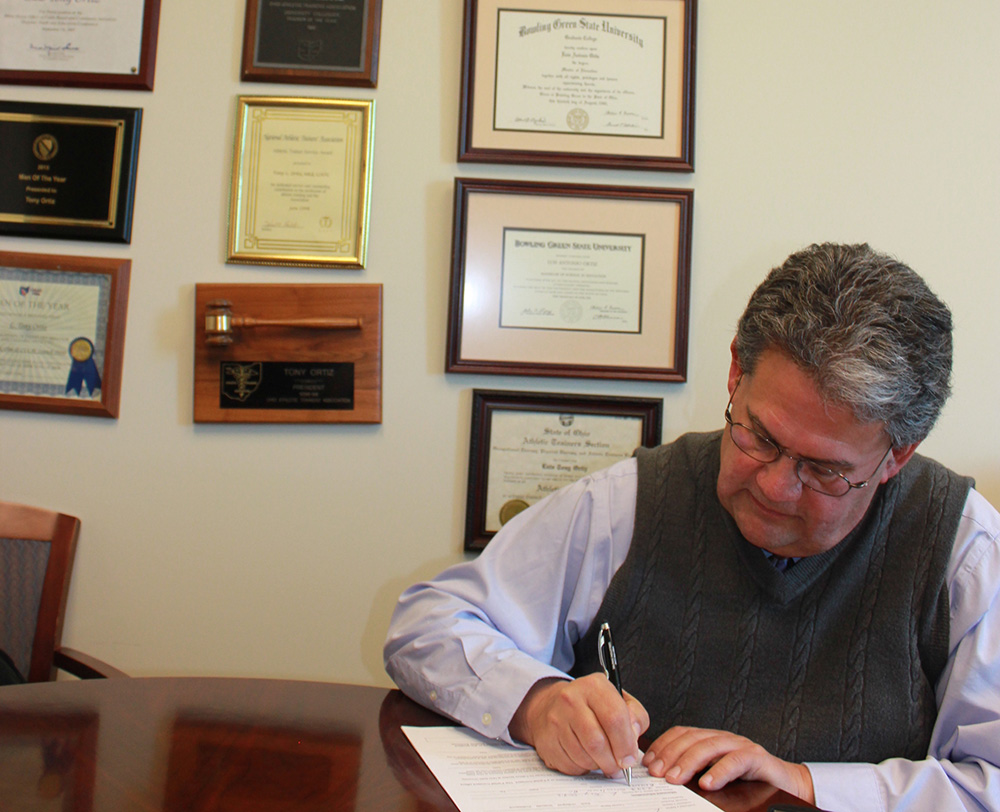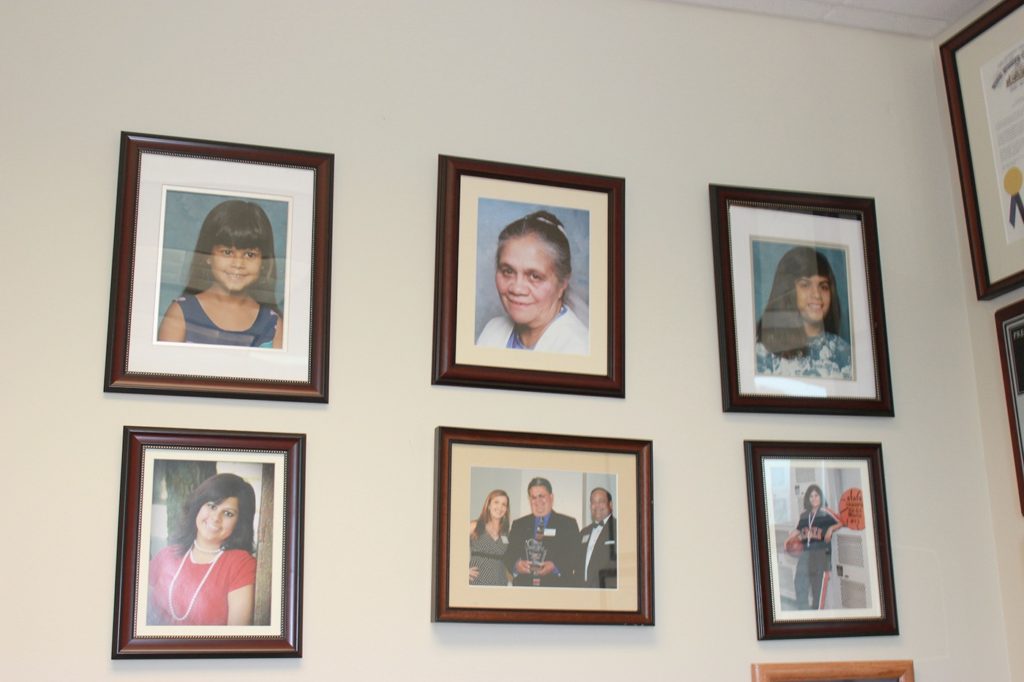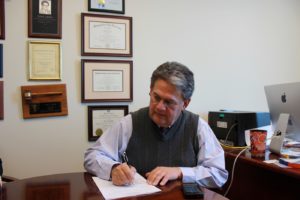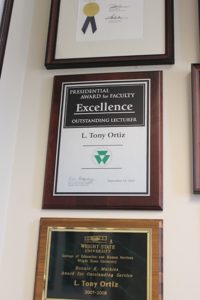2. Los Activistas
Tony Ortiz

EF: We are here with Toni Ortiz and thank you again for doing this interview with us and supporting our effort to document Latino presence in Ohio. So to start, where were you born and where did you grow up?
TO: Lorain, Ohio, near Cleveland. With a lot of Latinos there … yeah that’s where I grew up. It’s right by the lake. There was a huge number of Puerto Ricans and Mexicanos there really that migrated there and stayed there.
EF: So what is your background?
TO: I’m Puerto Rican. My parents were recruited out of Puerto Rico to come to work in the mills, in the trucking companies so there was a lot of them that came at the time and they all just stayed there. And literally one time it was the third largest population of Puerto Ricans besides New York and Chicago, so it was a lot of them.
EF: What was your childhood like?
Basically growing up I spoke Spanish at home, spoke English at school, and Spanglish on the streets. It was rough at first because one of the things that going home you couldn’t get help, I struggled in the beginning, but we made it.
TO: I was one of thirteen kids. I was the third out of the thirteen; the first to graduate out of high school, and the first to graduate out of college. My older brother got sick and my older sister got married early and had six kids.
EF: What memories do you have of growing up here in this area and with this unique background of growing up in Lorain?
TO: In Lorain, the thing I remember the most is that everything was centered around the church. We had masses in Spanish, after every mass there was food so you ate different Puerto Rican foods and Mexican foods. There was just a lot that centered around the church, everything we did was around the church. My mom was at church every day. That’s a picture of my mom up there. [Points to picture on wall]
Listen Tony Ortiz’s Interview
EF: Did you grow up hearing both languages?
TO: Yes. I was just writing a grant for something. I had to write why I was doing it. Basically growing up I spoke Spanish at home, spoke English at school, and Spanglish on the streets. It was rough at first because one of the things that going home you couldn’t get help, I struggled in the beginning, but we made it.
EF: Are your parents still around?
TO: No. Both my parents passed.
EF: What songs or stories were part of your family growing up, of your parents or friends?
TO: With thirteen kids there was all sorts of different music playing all the time so it was like My Big Fat Greek Wedding, it was like that all the time. Food all the time and it was always eaten hot because if you didn’t eat it hot you didn’t eat it. Never had leftovers. We never locked the doors because that’s too many keys to issue so the doors were always open so there were a lot of different people there all the time.
EF: Now, you mentioned you have children.
TO: I have two daughters.
EF: What are some of the traditions that you try to keep with your family now?
TO: Unfortunately, down here in Dayton there weren’t a lot of Latinos at the school that I was at, when we first came here I went to Beavercreek High School to teach there and I was the first Latino they ever had there, and my daughters were a couple of a handful there. But we try to take them back up to Lorain all the time just so they can get a taste of the culture. But around here there wasn’t a lot of opportunity to do that. But they may miss some of that, but every time they went home to see Grandma and cousins it was a whole different world for them.

EF: What types of jobs have you had here in Ohio?
TO: I went to Bowling Green for my undergraduate, then I went to work in the NFL with the Philadelphia Eagles. I did that for an internship and then I went back to Bowling Green, got my Masters. No, I taught a year in between in Lorain and then I went back and got my Masters at Bowling Green and that was in 1980. Came here in [Dayton] 1980. I taught Spanish and was the athletic trainer at the high school. Came here in [Wright State University] ’85. Started the athletic training program for sports medicine program, and I just stopped doing that this past August. Then I basically started this new position. I’m the associate vice president for Latino affairs. I’m the first Latino administrator up here. I have my work cut out for me.
EF: That’s a lot of pressure.
TO: No pressure at all because, the president understands what we need to do, he’s just … I’ve got free reign, whatever I need to do. I’m really thankful for a lot of stuff I had then. I even have a little school on the east end of Dayton for little kids, for little Latino kids. It’s called El Puente Learning Center, I started that six years ago. We have thirty-five kids come there every day. I did it because that’s what they did at the church when I was growing up and that really helped us because a lot of my friends, including myself, would’ve stayed working there in the steel mills, we never would have had the opportunity to go to school if we didn’t get that additional help needed. So that’s what El Puente has become. It’s been very successful.
EF: Can you tell me a little bit about El Puente?
TO: Yeah, El Puente I started with Sister Maria, myself and Rosa Caskey, who you’re going to talk to tomorrow. And we started it, we have after school tutoring, but what makes it different than other tutoring programs is our college of education students all have to rotate through there. It’s part of a service-learning class. So it’s high quality tutoring … it’s an experience for the student teachers, but also great experience for the kids. But what’s happened is this center has become a magnet because all of the other schools in the area want to be part of it and it’s all privately funded. I get all of the money from friends, from grants that I apply for and there’s no cost to the kids. We have a long waiting list of people that want to get in. We basically pick the ones with the most needs, and not so much kids but just anybody. We get those kids from Dayton Public Schools and also the parochial schools nearby
EF: What was your main inspiration for opening up El Puente?
TO: I had the opportunity and the means to do it because the guy that first funded it for me, his kid played baseball. The guy was a multimillionaire – billionaire. If you’ve ever heard of Iam’s Pet Foods, he started Iam’s Pet Foods. So when I approached him about what I wanted to do, he says, he wrote the check out right there, so … and he’s written out a check every year.

EF: What has been the happiest day of your life?
TO: When my daughters were born. Yeah. I mean they … You know Maria, the one up there [points to picture on wall], is the oldest. She went to school in undergrad here and then she went to Loyola Marymount. She’s basically a filmer, she’s writing, she’s basically a film writer, a screenwriter. But she also, if you see the middle picture up there, she played basketball on a state championship team at the big school, so it was fun growing up and watching her. Then my youngest one Melissa went to Michigan State, undergrad, and just finished up her grad school here. But she’s fighting cancer so it’s been tough for her since she hasn’t really cut out her career.
EF: I guess one of the saddest days would be finding out that, right?
TO: Mhm, oh yeah.
EF: What are some of the stories that your daughters like to hear about you growing up?
TO: How I used to get smacked by my mom all the time for being a smart aleck. Yeah, I mean, they became real close to my mom because my mom was like a saint. I mean she was in church all the time. She did the rosaries for everybody every night somewhere. She took us along. It was just a special bond there. And they liked to hear that. In fact, my youngest daughter, her first year at Michigan State had to do an article on her, and I didn’t know a lot of stuff, but I had to sit there and interpret for my mom, or just to be there, and it was an unbelievable story.
EF: You learned stuff yourself?
TO: I learned a lot about my mom – I had no idea. Well for instance, my mom, she was supposed to be a nun, she was gonna become a nun, but because her parents didn’t get married through the church, it didn’t allow her to become a nun. Luckily for thirteen of us that that occurred!
EF: Yes, yes. She went from a nun to the mother of thirteen.
TO: Yeah.
EF: What does Ohio mean to you?
TO: Opportunity. Especially down here. There’s just so many schools here. Plus we got Wright-Pat air force base right there. So there’s a lot of changes constantly going, a lot of opportunities for people that come here and do well. Really there’s no excuse because opportunities are there. If you don’t take advantage of the opportunities, it’s no one’s fault, but yourself, because the chances are there.
EF: We’ve heard that from other people that we’ve interviewed that Ohio means opportunities, that you don’t find in other states.
TO: I mean like here we’ve got ten colleges within thirty miles of each other. It’s crazy, and I mean they all are looking for Latino students. We just need to push the Latino families to change that mindset of working and working hard. If they work hard now, they work less later. Work and use your brains. Brain power versus man power. I mean it’s … you’re gonna get a lot further in it. It’s just convincing the families that, “hey, you don’t need that car right now, you can buy ten cars later.”
EF: Would you say that a lot of the work that you’ve done here in the community is educating parents about the importance of higher education?
TO: Mhm, yeah, and just showing them how easy the process is, because I would have never been here if it wasn’t for a guy named Sao Torres back in Lorain, Ohio. Because my parents couldn’t help me go to school, but he took an interest in the Latinos there and he helped us fill out the paperwork, take us through the process, visit schools, and have us start. We need more Sao Torres like that throughout the whole state to get kids in school.
EF: If you could keep a memory in life forever, what would it be?
TO: This job right now.
EF: This job, this job is the dream.
TO: Yeah, because I really, you know, being up here, working for the President, there’s no limits as to what I can do. If I have an idea, I just take it down the hall and tell him what I want to do and he says: “Do it”! I don’t have to go through a lot of different layers. Because what’s happened in a lot of places, is you have a great idea and you take it to a certain person and they stop it and it never goes anywhere. I don’t have to do that, I just have to go right down the hall, and he either says “yes” or “no”. Ninety percent of the time he can’t say no to me, so.

EF: Great. I can guess right now that the job that you have is one of the proudest moments of your life. Can you think of other ones that have made you proud?
TO: Um, yeah. It’s not up here, but my students in athletic training, when I got done, when I was done with the program, they had a function for me. They created a scholarship in my name which is endowed as like $20,000 and it’s endowed for life. What happens with that money, we pick a couple students every year, they get money, otherwise they couldn’t afford coming to school. So, that’s there. That’s there forever.
EF: If you were to offer advice to immigrants to Ohio, what would you tell them?
TO: Come. Come and settle because there’s affordable housing, also my advice to them as well is to get into good schools, get involved, tell their parents get involved, okay. Because if you don’t get involved and learn the process … get involved and make sure that your kid is getting what they deserve.
EF: What message would you like to give to your kids, or grandkids in the future about life in general?
TO: Don’t sit back. You know, if you want something done, take the initiative to start it and see it through. Follow through, get it done. And don’t do it haphazardly. Take pride in what you do.
